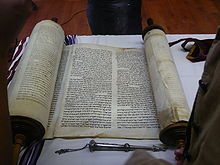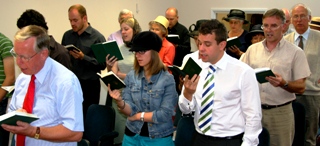Rabbi Sylvia Rothschild, working in England, writes
Interestingly while Judaism teaches that mitzvot are divinely ordained and therefore not to be questioned or even necessarily understood, it does at the same time try to explain them as a rational force, and many commentators suggest reasons for our doing them.
We are told: – “The essential reason for the commandments is to make the human heart upright” ( ibn Ezra on Deut 5:18); or “Each commandment adds holiness to the people of Israel.” (Issi ben Akavia, Mechilta on Ex 22:30); or even that “The purpose of the mitzvot is…to promote compassion, loving kindness and peace in the world” (Maimonides, yad, Shabbat) {Parashat Mishpatim. What is the purpose of mitzvot?}

The Covenant Confirmed, by John Steeple Davis (1844-1917), as in Exodus 24 (Photo credit: Wikipedia)
Those who believe in the God of Abraham, should know that this God of gods has given the many commandments to help man find his way in this universe and to live in a proper peaceful relation with God’s creation.
The world has been given Mishpatim, which we may consider judgements by ‘laws’ or ‘rulings’ and they will govern the community who agree to accept them. But not all humans will accept them, that’s a fact. Also in the previous times people of God did not have it easy at all times with those Mishpatim, though just after Moses has finished relating all the various laws to the Children of Israel, we can see in the Old Testament how often those People of God went astray.
Real lovers of God should agree “to do all the things that God has spoken” (Exodus 24:3). They should cling to the Word of God as the only Perfect Rule Giver and should go for keeping “miẓwah”, the divinely instituted rule of conduct. As such, the divine commandments are divided into (1) mandatory laws known as  , and (2) those of a prohibitory character, the
, and (2) those of a prohibitory character, the  . This terminology rests on the theological construction that God’s will is the source of and authority for every moral and religious duty. Many of the old laws were given to and concerned only special classes of people, such as kings or priesthood, Levites or Nazarites, or are conditioned by local or temporary circumstances of the Jewish nation, as, for instance, the agricultural, sacrificial, and Levitical laws.
. This terminology rests on the theological construction that God’s will is the source of and authority for every moral and religious duty. Many of the old laws were given to and concerned only special classes of people, such as kings or priesthood, Levites or Nazarites, or are conditioned by local or temporary circumstances of the Jewish nation, as, for instance, the agricultural, sacrificial, and Levitical laws.
For us today some rules may be curious, and that is why at a certain moment in time some changes were allowed. It was not God Who changed, but the people who changed and God came closer to them by adapting His rulings. As such we may now face other food laws and about sanitation than at the early beginning, plus about how to relate to others, because certain concepts changed, like the position of slaves.
Torah scroll and silver pointer (yad) used in reading
Of the more than fifty mitzvot to be found in the sidra, we have some that deal with the treatment of slaves, with the crimes of murder and kidnap, with personal injury and with civil damages through neglect or theft. There are rules about witchcraft and idolatry, about oppression and unfair business practise, about applying legal codes in a prejudiced fashion and not giving false testimony; laws about not mistreating widows and orphans, and about care for animals. {Parashat Mishpatim. What is the purpose of mitzvot?}
When we look at those laws and regulations we may not forget that many still keep going and should be fulfilled by a lover of God. It is not because we have Jesus as our Messiah who liberated us from the curse of Law that the Law has ended. No, not at all. The Law still counts. Even now we have received a New Covenant, should we keep to those law covered in that covenant.
Too many Christians commit a mistake by thinking they do not have to do any works any-more. We still have to keep the works of faith, keeping to God’s Commandments.
In parshat Mishpatim, the Israelites learn that accepting the commandments is a 24/7 job. {Parenting by the Parshah – Mishpatim}
We also must be fully aware of the most frequent mitzvah in Torah, given at least 37 different times in the text,which is repeated in the Mishpatim too –
“you shall not wrong a stranger or oppress them, for you were strangers in the land of Israel.”
It is a mishmash of a legal code but what comes through loud and clear to the reader is the importance to the Jewish people of mitzvot, commandments.
From Torah we see that for the ancient people there were particular reasons for observing the mitzvot – firstly and most importantly because God tells us to. Secondly there was in the ancient understanding an idea that people who obeyed them would be rewarded, and people who disobeyed risked punishment. Then there were two different types of reason given in Torah – that the mitzvot were intrinsically imbued with divine wisdom, and that they would lead us to achieving holiness. {Parashat Mishpatim. What is the purpose of mitzvot?}
Each person who wants to become a Child of God, or to belong to God’s People shall have to resign oneself to the Will of God. But none can belong to the children of God when they do not accept others to be their brethren and sisters, and loving them as their siblings. The agape love for the others is a indispensible necessary part of belonging to God’s family.
In Judaism as in Christianity too there might be a tension in their tradition
– do we do the commandments (mitzvot) simply because there is a Commander (metzaveh) who told us to do this and this should be enough, or do we search out a meaning behind each mitzvah? And if we do the latter, what happens if we cannot find a suitable reason and meaning? Do we abandon the mitzvah as unreasonable or pointless? Or do we continue to do it in the hope that meaning will emerge? After all, at Sinai the people famously answered “na’aseh ve’nishma, [first] we will do it and [subsequently] we will understand”. {Parashat Mishpatim. What is the purpose of mitzvot?}
The tension and balancing between holding a religious belief and a rationalist position was as great in the ancient world as it is today. {Parashat Mishpatim. What is the purpose of mitzvot?}
For those who love God ‘blind faith’ was never a prerequisite, neither of a Jewish life nor of a Christian life.
Judaism tends to the position of na’aseh ve’nishma – doing in order to understand, blending faith and reason and giving neither the upper hand, but instead knowing that if we behave “as if” we believe, if we follow the way of mitzvot, then further understanding may come. {Parashat Mishpatim. What is the purpose of mitzvot?}
From Scriptures we should come to understand there is no way of doing “as if” because God sees the heart and He does knows each of us. We can not hide anything from Him.
1 Samuel 16:7 The Scriptures 1998+ (7) But יהוה {Jehovah} said to Shemu’ĕl, “Do not look at his appearance or at the height of his stature, because I have refused him, for not as man sees, for man looks at the eyes, but יהוה {Jehovah} looks at the heart.”
Jeremiah 17:10 The Scriptures 1998+ (10) “I, יהוה {Jehovah}, search the heart, I try the kidneys, and give every man according to his ways, according to the fruit of his deeds.

Moses with the Two New Tables of Stone (illustration from the 1897 Bible Pictures and What They Teach Us by Charles Foster) (Photo credit: Wikipedia)
Our hearts may not be removed from God and by our way of living we should show to others how God is in our heart. Our heart, our feelings but also how we act should always be pure, full of love for God and His commandments. When we are willing to give ourselves into God’s Hands He will bring us where He wants us to be.
Proverbs 21:1-3 The Scriptures 1998+ (1) The sovereign’s heart is as channels of water In the hand of יהוה {Jehovah}; He turns it wherever He wishes. (2) All a man’s ways are right in his own eyes, But יהוה {Jehovah} weighs the hearts. (3) To do righteousness and right-ruling Is more acceptable to יהוה {Jehovah} than a slaughtering.
Each day we have to work at ourself taking care we keep to the commandments of God.
Meanwhile we are impacting on ourselves and on our world in a positive way as we are directed to behaviour that may not be our first instinct – to support the poor and downtrodden, to value life, to respect the boundaries of others, to rein in our own power and desires so as not to trample over the lives of others. The list goes on. {Parashat Mishpatim. What is the purpose of mitzvot?}
As tradition says again and again in different words, the same message: “the commandments were given only to refine God’s creatures…”(Midrash Tanchuma). They change us, they cause us to think about what we are doing and not to act out of immediate self interest, they shape our behaviour and ultimately they may help us to bring holiness into our world. {Parashat Mishpatim. What is the purpose of mitzvot?}
+
Preceding
When believing in God’s existence and His son, possessing a divine legislation
A Royal Rule given to followers of Christ
First man’s task still counting today
Whoopi Goldberg commandments and abortion
He who knows himself, is kind to others
January 27, 417, Pope Innocent I condemning Pelagius about Faith and Works
Letter to the Romans, chapter 3
Letter to the Romans, chapter 4
Additional comments to the 3rd Letter to the Romans
Additional comments to the Letter to the Romans 4
Comments to James remarks, about Faith and works
Which is worse–works without faith, or faith without works?
Christians remaining hidden not sharing the gospel
Crisis man needed in this world
Preaching Christ Is Not Enough
Beautiful feet of those who announce the good news
A Christian has to have eyes and ears and a tongue to use in good ways
Daring to speak in multicultural environment
Perishable non theologians daring to go out to preach
++
Additional reading
- Bible in the first place #1/3
- Creator and Blogger God 3 Lesson and solution
- Creator and Blogger God 4 Expounding voice
- Creator and Blogger God 6 For His people
- God-breathed prophetic words written torah and the mitzvot to teach us
- Words God speaks unto all and the Spirit that quickens
- The Bible is a today book
- Necessary to be known all over the earth
- God’s design in the creation of the world
- Time passing away
- Best intimate relation to look for
- Let us not forget it was God who chose us
- Daily Spiritual Food To prepare ourselves for the Kingdom of God
- Engaging the culture without losing the gospel
- A god who gave his people commandments and laws he knew they never could keep to it
- Knowing where to go to
- I Only hope we find GOD again before it is too late !
- The inspiring divine spark
- A good idea to halt all activity for one hour some day
- Eternity depends upon this short time on earth
- Act as if everything you think, say and do determines your entire life
- Truth never plays false roles of any kind, which is why people are so surprised when meeting it
- Foundation to go the distance
- Preferring to be a Christian
- Aim High: Examples of Godly Characters to follow
- Purify my heart
- United people under Christ
- Honesty beginning of holiness
- Holiness and expression of worship coming from inside
- How we think shows through in how we act
- Object of first woe
- Think hard before you act today
+++
Further reading
- The Kotel Decision: The Parties at the Table
- Mishpatim פרשת משפטים
- Mishpatim – Who’s Serving Whom?
- Shift and Consolidation: Thoughts on the Torah Portions Mishpatim and Terumah
- Commentary for Mishpatim
- Mishpatim – Its just a White Lie
- When the plumbers stop society’s moral leaks
- Parashat Mishpatim /
- Shabbat Parashat Mishpatim 5776–Shabbat Torah Study at Adat Shalom Synagogue–Don’t Make Him Tell on You
- Mishpatim – Wholly Love
- Parshat Hashavuah: Mishpatim by Alex Gage
- Scripture for 2.5.2016
- Stole My Heart – Parshat Mishpatim 5776
- Parsha Mishpatim
- Shabbat Shalom! – Mishpatim
- Dvar Torah Parshat Mishpatim 5776 2016
- Mishpatim 5774 – Visión y Detalles
- Double Cry – Mishpatim 5776
- Il monoteismo etico – Parashat Mishpatim
- Mishpatim: Where heaven and earth converge
- Parenting by the Parshah – Mishpatim
- Parashat Kedoshim – What is it doing here?
+++





































































Pingback: Today’s thought “Plea for Vindication or for Protection against Oppressors” (January 07) – Belgian Ecclesia Brussel – Leuven
Pingback: How should we worship God? #8 Love one another – Belgian Ecclesia Brussel – Leuven
Pingback: Today’s Thought “To whom will ye liken me, and make me equal, and compare me, that we may be like? ” (June 22) – Belgian Ecclesia Brussel – Leuven
Pingback: The Dead — Where Are They? 18 King Saul and the Witch of Endor | Bijbelvorser = Bible Researcher
Pingback: Lent, 40 days, meditation and repentance – Some View on the World
Pingback: Thought of today: Considering Holiness In Your Life | From guestwriters
Pingback: A culture of “democratic cleansing” – Elders and youngsters versus respect | From guestwriters
Pingback: Not always so easy to keep to the sabbath – Jeshuaisten / Jeshuaists
Pingback: Women’s passion – Worldviewer